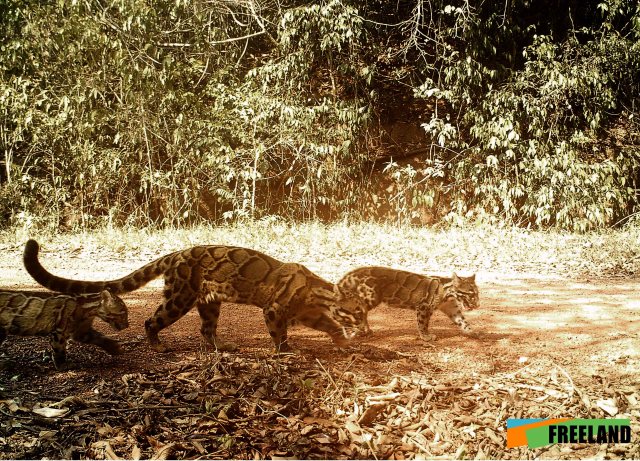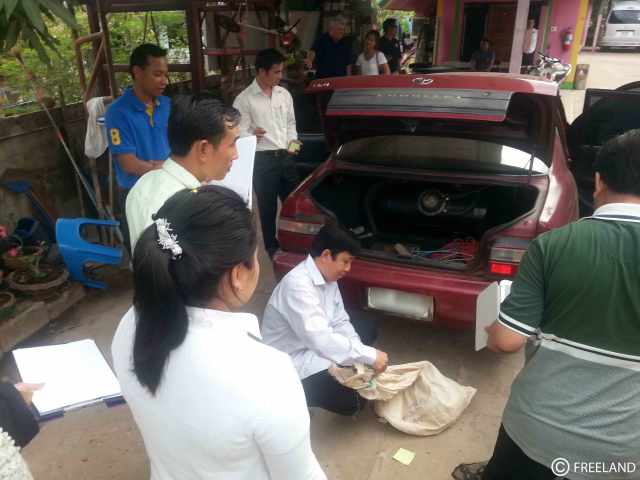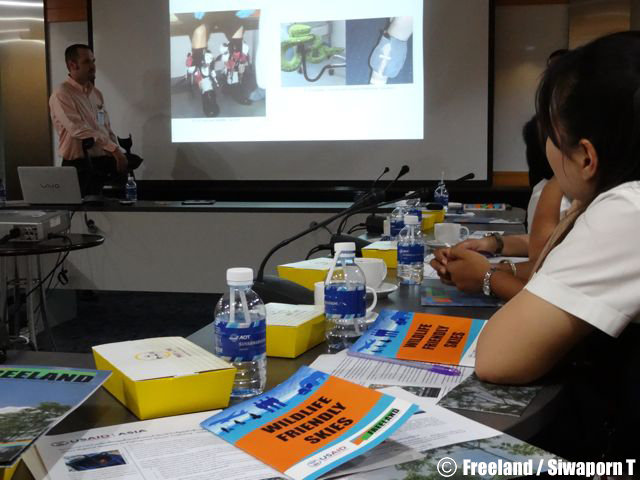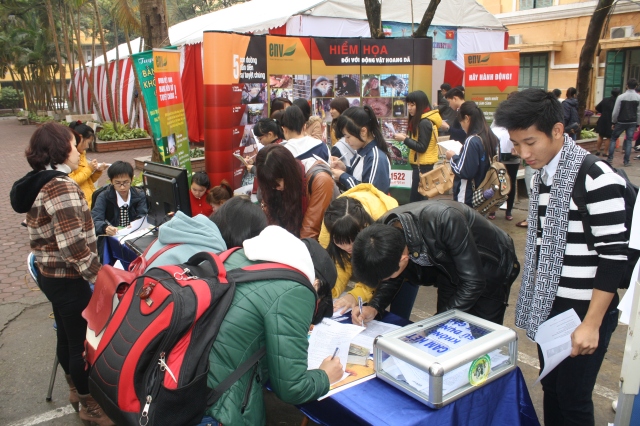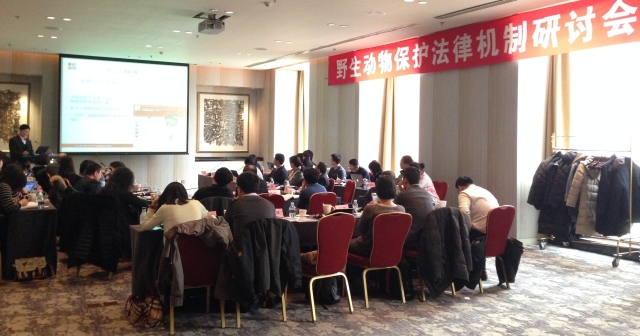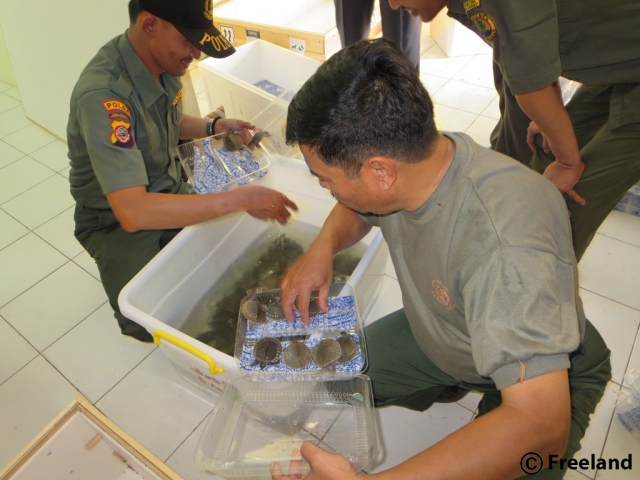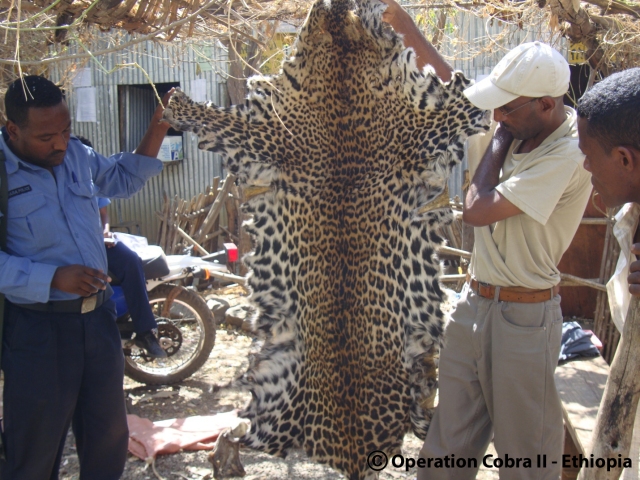Updates from USAID-funded Asia’s Regional Response to Endangered Species Trafficking (ARREST) Program can be found here
All new ARREST Stories can be found at Freeland.org
News and Stories of the USAID-funded Asia’s Regional Response to Endangered Species Trafficking (ARREST) Program can now be found by visiting the Freeland website by following the link below.
International Investigator Training Targets Wildlife Trafficking Hotspot
From March 16-24, twenty-six law enforcement officers from Lao People’s Democratic Republic and Thailand underwent an intensive bilateral investigations training course at a major endangered species smuggling corridor. The course focused on investigation techniques to detect ongoing wildlife trafficking between Thailand and Lao PDR, a major route for smuggling wildlife, including tigers, pangolins (scaly anteaters), and many other endangered species destined for markets in China and Vietnam. Law enforcement investigators including customs, police, wildlife officers, and prosecutors attended the course, which provided participants from Lao PDR’s Department of Forestry Inspection with their first-ever training in advanced investigations. The U.S.-supported training course developed the capacity of the officers to investigate organized criminal groups engaged in natural resource and wildlife crime. The course was also designed to improve enforcement collaboration between the two countries, which are both members of the Association of Southeast Asian Nations Wildlife Enforcement Network (ASEAN-WEN). The U.S. State Department’s Bureau of International Narcotics and Law Enforcement Affairs co-funded the course, which was conducted by Freeland, a Bangkok-based counter-trafficking organization. Freeland implemented the training course as part of the USAID-funded Asia’s Regional Response to Endangered Species Trafficking (ARREST) Program, the U.S. Government’s largest counter wildlife trafficking initiative.
Asian Park Chiefs Trained with New Counter-Poaching Technology
 From March 3-16, eighteen senior environmental officials from nine Asian countries came together in Thailand for the 4th Protected-area Operational and Tactical Environment Conservation Training (PROTECT) Managers course. The course is designed to help protected area enforcement managers counter the intense wildlife poaching and illegal logging taking place across Southeast Asia, which feeds the global multi-billion dollar illegal wildlife trade. The course focused on essential protected area management skills such as patrolling and nature crime investigations. The training course launched the PROTECT-FIST (Field Information Support Tool) program, a cutting-edge software application that allows park chiefs and managers to monitor and communicate with ranger patrol teams at all times, in any location, for real-time analysis. The course also used new, interactive park management simulation and mapping technology, which produces realistic scenarios for training and testing of counter-poaching patrols. Experts from USAID partner Freeland worked together with Thailand’s Department of National Parks, Wildlife and Plant Conservation and ASEAN-Wildlife Enforcement Network to provide the training. The course was held as part of the USAID-sponsored Asia’s Regional Response to Endangered Species Trafficking program—the U.S. Government’s largest counter wildlife trafficking initiative working throughout Asia to stop wildlife crime.
From March 3-16, eighteen senior environmental officials from nine Asian countries came together in Thailand for the 4th Protected-area Operational and Tactical Environment Conservation Training (PROTECT) Managers course. The course is designed to help protected area enforcement managers counter the intense wildlife poaching and illegal logging taking place across Southeast Asia, which feeds the global multi-billion dollar illegal wildlife trade. The course focused on essential protected area management skills such as patrolling and nature crime investigations. The training course launched the PROTECT-FIST (Field Information Support Tool) program, a cutting-edge software application that allows park chiefs and managers to monitor and communicate with ranger patrol teams at all times, in any location, for real-time analysis. The course also used new, interactive park management simulation and mapping technology, which produces realistic scenarios for training and testing of counter-poaching patrols. Experts from USAID partner Freeland worked together with Thailand’s Department of National Parks, Wildlife and Plant Conservation and ASEAN-Wildlife Enforcement Network to provide the training. The course was held as part of the USAID-sponsored Asia’s Regional Response to Endangered Species Trafficking program—the U.S. Government’s largest counter wildlife trafficking initiative working throughout Asia to stop wildlife crime.
Changes to Wildlife Law Debated at Top Thai University
![]()
 On March 3rd, Thailand’s leading university, Chulalongkorn University, hosted a public Town Hall meeting to discuss the urgently needed revision of Thailand’s outdated wildlife protection law, the Wildlife Animal Preservation and Reservation Act (WARPA). The law was discussed and debated by academics, law enforcement officials, NGO representatives, and students who highlighted the weak penalties and legal loopholes as priorities for reforming the WARPA. The event, co-sponsored by the USAID and its partner Freeland, was part of the Asia’s Regional Response to Endangered Species Trafficking Program’s iThink public awareness campaign. During the meeting participants reached consensus that the law needed reforming urgently to help counter the prolific and organized wildlife trafficking situation in Thailand. According to the Department of National Parks, Wildlife and Plant Conservation more than 10,000 animals were confiscated in 2013. Key recommendations included increasing cooperation between agencies, increasing law enforcement, and stamping-out corruption. The Town Hall recommendations will be forwarded to relevant government agencies and the Committee of Natural Resources, Land and Environment of Thailand’s House of Representatives and Senate, the committee responsible for amending the WARPA.
On March 3rd, Thailand’s leading university, Chulalongkorn University, hosted a public Town Hall meeting to discuss the urgently needed revision of Thailand’s outdated wildlife protection law, the Wildlife Animal Preservation and Reservation Act (WARPA). The law was discussed and debated by academics, law enforcement officials, NGO representatives, and students who highlighted the weak penalties and legal loopholes as priorities for reforming the WARPA. The event, co-sponsored by the USAID and its partner Freeland, was part of the Asia’s Regional Response to Endangered Species Trafficking Program’s iThink public awareness campaign. During the meeting participants reached consensus that the law needed reforming urgently to help counter the prolific and organized wildlife trafficking situation in Thailand. According to the Department of National Parks, Wildlife and Plant Conservation more than 10,000 animals were confiscated in 2013. Key recommendations included increasing cooperation between agencies, increasing law enforcement, and stamping-out corruption. The Town Hall recommendations will be forwarded to relevant government agencies and the Committee of Natural Resources, Land and Environment of Thailand’s House of Representatives and Senate, the committee responsible for amending the WARPA.
Airline Industry Joins Wildlife Protection Program
Together with Royal Thai Customs, Airports of Thailand (AOT), Kenya Airlines and Delta Airlines, Freeland, a Bangkok-based counter-trafficking organization, launched the Wildlife Friendly Skies training as part of the U.S. Agency for International Development (USAID) funded Asia’s Regional Response to Endangered Species Trafficking Program. The training held on February 20 and 21 included flight attendants, cargo and baggage handlers, airport security and Customs officials at Bangkok’s Suvarnabhumi International Airport. The 56 participants, including 23 female, learned how today’s traffickers are attempting to circumvent inspectors and laws to smuggle rare and endangered wildlife through Suvarnabhumi Airport, a hotspot for wildlife trafficking and one of the world’s busiest airports serving more than 50 million passengers per year. The course focused on Suvarnabhumi Airport’s links to wildlife source, transit and consumer countries in Africa, Asia, Europe and North America. Law enforcement and wildlife experts from Freeland showcased real incidents to illustrate the scale and seriousness of wildlife smuggling. Trainers also provided tips on how to detect and respond to wildlife trafficking. WildScan, a new smartphone application developed with USAID funding by Freeland for identifying endangered species and wildlife crime was also introduced. Course organizers aired public service announcements featuring local key opinion leaders, as well as the U.S. Ambassador to Thailand that have been developed for television, airports and airlines. The new airline partnership was brokered jointly with the U.S. Embassy Bangkok, and highlights the importance of public and private sector collaboration to combat illicit trade. Freeland will continue to expand the Wildlife Friendly Skies Program, tailoring the course to specific airports and airline routes to ensure relevant staff are equipped to help end wildlife trafficking.
Vietnamese Students engaged with Wildlife Trade Exhibits
Education for Nature-Vietnam(ENV) continued public awareness raising program with wildlife trade exhibits at Hanoi University and the University of Social Sciences and Humanities on February 20 and 24 respectively. The wildlife trade exhibits attracted nearly 600 students who were eager to learn more about illicit wildlife trade and ways to help reduce consumption of popular illicit products such as tiger bone glue and rhino horn. The exhibitions were held as part of the consumption reduction campaign of the USAID-funded Asia’s Regional Response to Endangered Species Trafficking Program. ENV, a partner of the program, will continue public outreach at universities to engage youth in a country infamous for its consumption of endangered species, especially critically endangered animals such as Africa’s rhinos.
Wildlife law Revision Workshop held in China
On February 18, BeijingNormalUniversity, a partner of the USAID-funded Asia’s Regional Response to Endangered Species Trafficking Program (ARREST) facilitated and co-hosted a workshop on revising China’s Wildlife Protection Law in Beijing. Representatives from governmental agencies, non-governmental organizations and the private sector attended the workshop. They included the National Resources Defense Council (NRDC), the International Union for the Conservation of Nature (IUCN), China Zoological Society, All China Environmental Protection Federation, and China Environmental Legislation Association. The workshop looked at issues related to the People’s Republic of China’s current Wildlife Protection Law including captive breeding of endangered species, the lack of an open mechanism for revising the listing of endangered species and the lack of participation from civil society stakeholders in the process of revising the law. Participants of the workshop agreed that a revised law should have articles on strict protection principals, limiting captive breeding to conservation purposes and periodically reviewing endangered species listings based on the IUCN Red list’s assessment procedures. The public should also be well informed of the entire revision process. The importance of raising public awareness to reduce consumption of endangered species in China was also highlighted by many stakeholders at the workshop. Officials from China’s National People’s Congress committed to considering suggestions from civil society during the revision process and to bring the workshop’s recommendations back to a group of congressmen for further discussion.
Thousands of Stolen Turtles Returned to Wild
More than two thousand rare turtles that were confiscated from traffickers last month in a cross border law enforcement operation were successfully repatriated to their native wild home in Indonesia on February 13, 2014. The “Pig-nosed” turtles (Carettochelys insculpta) were confiscated in Hong Kong on January 12th by local authorities after they received a tip-off during a global wildlife enforcement sting operation code-named “Cobra II”. The turtles were poached and trafficked out of Indonesia and destined for mainland China. Investigations continue as investigators look into who were the illegal exporters from Indonesia and illegal importers in China. In coordination with Operation Cobra II participants, Freeland, the implementing partner of the USAID-funded Asia’s Regional Response to Endangered Species Trafficking Program (ARREST) joined the Indonesia’s Ministry of Forestry, World Society for the Protection of Animals (WSPA) and Garuda Airlines to organize the repatriation. China’s State Forestry Administration and Hong Kong Customs and Excise Department cooperated to take care of the turtles until they could be repatriated to their natural habitat. Repatriating the turtles was no easy feat and the collaboration of the organizations involved stands as a testament to conservation and animal welfare cooperation. After the confiscation of the turtles in Hong Kong, the turtles were cared for by the Kadoorie Farm and Botanic Garden before being flown back to Indonesia by Garuda Airlines. After arriving in Jakarta, the turtles were then flown to the remote Papua region of eastern Indonesia. The turtles were then transferred upriver where they were released in the protected Lorentz National Park. The illicit trade in endangered species, estimated at US$ 19 billion annually, is ravaging the world’s biodiversity and driving many species towards extinction. New cross-border wildlife enforcement operations like Cobra II are being organized by ARREST partner ASEAN Wildlife Enforcement Network (ASEAN-WEN) and partner governments, with support from Freeland and other NGOs. Cobra II resulted in the arrests of over 400 criminals in Asia and Africa during January. In spite of increased confiscations, many criminals are escaping justice and remain at large. Freeland and partners are providing information and other support to authorities’ intent on curbing illegal trade and corruption.
Global Wildlife Protection Operation Cobra II Achieves Impressive Results
From December 2013 through the end of January 2014, law enforcement officers from 28 countries conducted a ground-breaking, global operation to combat wildlife poaching and trafficking, code-named “Operation Cobra II.” The month-long operation and capacity building activity promoted cross-border law enforcement cooperation and is drawing praise from the conservation community for its impressive results, including more than 400 arrests of wildlife criminals and 350 major wildlife seizures across Africa and Asia. Operation Cobra II also resulted in the seizure of 36 rhino horns, over three metric tons of elephant ivory, over 10,000 turtles, more than 1,000 skins of protected species, more than 10,000 European eels, and over 200 metric tons of endangered rosewood. Police, Customs, and wildlife officials from China, Africa, Southeast and South Asia, as well as the United States joined together with international enforcement agencies to stage the operation out of two coordination centers in Nairobi and Bangkok, with links to field operatives across Africa and Asia. Among the many arrests were several wildlife kingpins.Operation Cobra II was financially supported principally by the U.S. State Department Bureau of Narcotics and International Law Enforcement Affairs (INL), the U.S. Fish and Wildlife Service’s (USFWS) Rhinoceros and Tiger Conservation Fund and African Elephant Conservation Fund and the China Wildlife Conservation Association. Joint training exercises that led to Cobra were conducted by the Special Investigation Group on wildlife trafficking, which has received technical and financial support from the U.S. Agency for International Development (USAID) sponsored Asia’s Regional Response to Endangered Species Trafficking Program (ARREST), implemented by the counter-trafficking organization Freeland. The International Fund for Animal Welfare (IFAW), another program partner, provided additional financial support, as did the Canadian Embassy in Kenya and participating countries. Freeland mobilized and provided financial, logistical and training support as well as tip-off information on wildlife trafficking syndicates.

